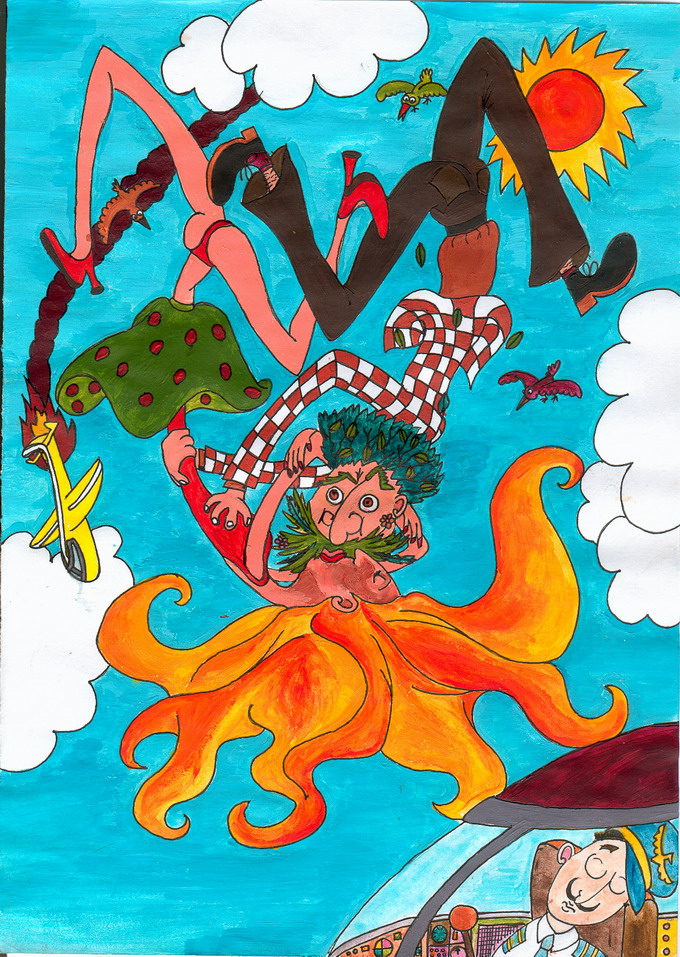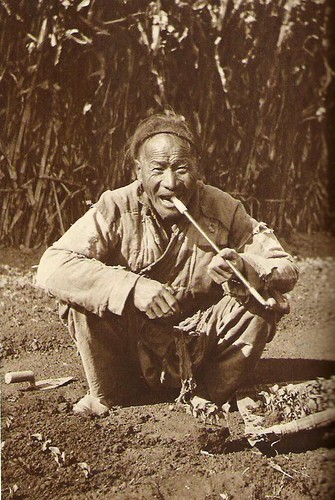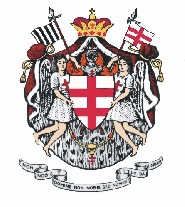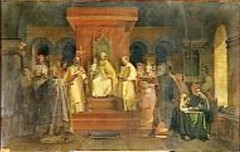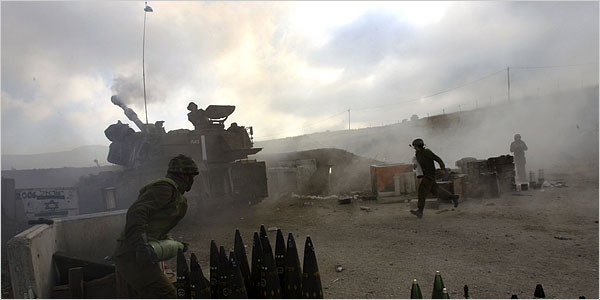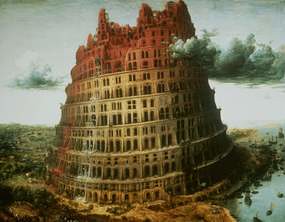"Parmi les contradictions qui entrent dans le gouvernement de ce monde ce n’en est pas un petite que cette institution de moines armées qui font vœu de vivre là a fois en anachoretes et en soldats."--Voltaire sur les Mœurs et l’Esprit des Nations.
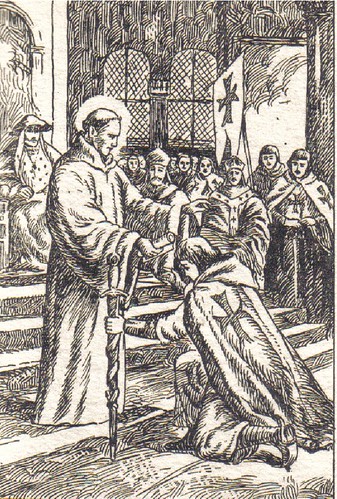
"THE RULE OF THE POOR FELLOW-SOLDIERS OF JESUS CHRIST AND OF THE TEMPLE OF SOLOMON," arranged by St. Bernard, and sanctioned by the Holy Fathers of the Council of Troyes, for the government and regulation of the monastic and military society of the Temple, is principally of a religious character, and of an austere and gloomy cast. It is divided into seventy-two heads or chapters, and is preceded by a short prologue, addressed "to all who disdain to follow after their own wills, and desire with purity of mind to fight for the most high and true king," exhorting
p. 16
them to put on the armour of obedience, and to associate themselves together with piety and humility for the defence of the holy catholic church; and to employ a pure diligence, and a steady perseverance in the exercise of their sacred profession, so that they might share in the happy destiny reserved for the holy warriors who had given up their lives for Christ.
The rule enjoins severe devotional exercises, self-mortification, fasting, and prayer, and a constant attendance at matins, vespers, and on all the services of the church, "that being refreshed and satisfied with heavenly food, instructed and stablished with heavenly precepts, after the consummation of the divine mysteries," none might be afraid of the fight, but be prepared for the crown. If unable to attend the regular service of God, the absent brother is for matins to say over thirteen pater-nosters, for every hour seven, and for vespers nine. When any templar draweth nigh unto death, the chaplains and clerk are to assemble and offer up a solemn mass for his soul; the surrounding brethren are to spend the night in prayer, and a hundred pater-nosters are to be repeated for the dead brother. "Moreover," say the holy Fathers, "we do strictly enjoin you, that with divine and most tender charity ye do daily bestow as much meat and drink as was given to that brother when alive, unto some poor man for forty days." The brethren are, on all occasions, to speak sparingly, and to wear a grave and serious deportment. They are to be constant in the exercise of charity and almsgiving, to have a watchful care over all sick brethren, and to support and sustain all old men. They are not to receive letters from their parents, relations, or friends, without the license of the master, and all gifts are immediately to be taken to the latter, or to the treasurer, to be disposed of as he may direct. They are, moreover, to receive no service or attendance from a woman, and are commanded, above all things, to shun feminine kisses.
p. 17
There is much that is highly praiseworthy in this rule, and some extracts there from will be read with interest.
"VIII. In one common hall, or refectory, we will that you take meat together, where, if your wants cannot be made known by signs, ye are softly and privately to ask for what you want. If at any time the thing you require is not to be found, you must seek it with all gentleness, and with submission and reverence to the board, in remembrance of the words of the apostle: Eat thy bread in silence, and in emulation of the psalmist, who says, I have set a watch upon my mouth; that is, I have communed with myself that I may not offend, that is, with my tongue; that is, I have guarded my mouth, that I may not speak evil.
"IX. At dinner and at supper, let there be always some sacred reading. If we love the Lord, we ought anxiously to long for, and we ought to hear with most earnest attention, his wholesome words and precepts . .
"X. Let a repast of flesh three times a week suffice you, excepting at Christmas, or Faster, or the feast of the Blessed Mary, or of All Saints. . . . . On Sunday we think it clearly fitting and expedient that two messes of flesh should be served up to the knights and the chaplains. But let the rest, to wit, the esquires and retainers, remain contented with one, and be thankful therefor.
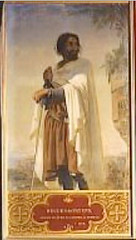
"XI. Two and two ought in general to eat together, that one may have an eye upon another . . . . . .
"XII. On the second and fourth days of the week, and upon Saturday, we think two or three dishes of pulse, or other vegetables, will be sufficient for all of you, and so we enjoin it to be observed; and whosoever cannot eat of the one may feed upon the other.
"XIII. But on the sixth day (Friday) we recommend the Lenten food, in reverence of the Passion, to all of you, excepting such as be sick; and from the feast of All Saints until Easter, it must be eaten but once a day, unless it happen to be Christmas-day, or the feast of Saint Mary, or of the Apostles, when they may eat thereof twice; and so at other times, unless a general fast should take place.
"XIV. After dinner and supper, we peremptorily command thanks to
p. 18
be given to Christ, the great Provider of all things, with a humble heart, as it becomes you, in the church, if it be near at hand, and if it be not, in the place where food has been eaten. The fragments (the whole loaves being reserved) should be given with brotherly charity to the domestics, or to poor people. And so we order it.
"XV. Although the reward of poverty, which is the kingdom of heaven, be doubtless due unto the poor, yet we command you to give daily unto the almoner the tenth of your bread for distribution, a thing which the Christian religion assuredly recommends as regards the poor.
"XVI. When the sun leaveth the eastern region, and descends into the west, at the ringing of the bell, or other customary signal, ye must all go to compline (evening prayer;) but we wish you beforehand to take a general repast. But this repast we leave to the regulation and judgment of the Master, that when he pleaseth you may have water, and when he commandeth you may receive it kindly tempered with wine: but this must not be done too plentifully, but sparingly, because we see even wise men fall away through wine.
"XVII. The compline being ended, you must go to bed. After the brothers have once departed from the hall, it must not be permitted any one to speak in public, except it be upon urgent necessity. But whatever is spoken must be said in an under tone by the knight to his esquire. Perchance, however, in the interval between prayers and sleep, it may behove you, from urgent necessity, no opportunity having occurred during the day, to speak on some military matter, or concerning the state of your house, with some portion of the brethren, or with the Master, or with him to whom the government of the house has been confided: this, then, we order to be done in conformity with that which hath been written: In many words thou shalt not avoid sin; and in another place, Life and death are in the hands of the tongue. In that discourse, therefore, we utterly prohibit scurrility and idle words moving unto laughter, and on going to bed, if any one amongst you hath uttered a foolish saying, we enjoin him, in all humility, and with purity of devotion, to repeat the Lord's Prayer.
"XVIII. We do not require the wearied soldiers to rise to matins, as it is plain the others must, but with the assent of the Master, or of him who hath been put in authority by the Master, they may take their rest; they must, nevertheless, sing thirteen appointed prayers, so that their minds be in unison with their voices, in accordance with that of the prophet: Sing wisely unto the Lord, and again, I will sing unto thee in the sight of the angels. This, however, should always be left to the judgment of the Master . . . . . . . (Continued in
Au piranha’s warehouse)
 And when night, darkens the streets, then wander forth the sons of Belial, flown with insolence and wine. (J. Milton)
And when night, darkens the streets, then wander forth the sons of Belial, flown with insolence and wine. (J. Milton)
